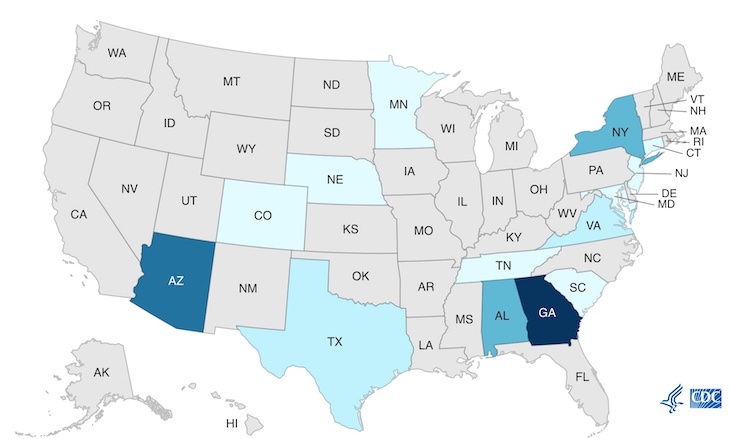The Centers for Disease Control and Prevention (CDC) is reporting an update on the domestically acquired cyclospora outbreak with illness onset on or after April 2023. In the past few years there have been large cyclospora outbreaks in the United States during the summer months. People usually get sick by eating contaminated fresh produce.

Outbreak Numbers
“Domestically acquired” is an important distinction, since it used to be that people contracted this parasite when they traveled outside the United States to tropical regions, and ate contaminated produce. That is no longer the case, as of 2019. Last year there were at least 1,129 cases of cyclosporiasis in the U.S.
There are at least 97 people sick in 16 states. Sixteen people have been hospitalized.
The case count by state is: Georgia (22-25), Arizona (16-21), Alabama (10-15), New York (10-15), Virginia (4-9), Texas (4-9), New Jersey (1-3), Connecticut (1-3), South Carolina (1-3), Tennessee (1-3), Colorado (1-3), Maryland (1-3), Minnesota (1-3), and Nebraska (1-3). This is an unusual way of reporting numbers, but the data include case data that have been reported directly to the Cyclospora surveillance program at the CDC, and may not match with what is listed in the Nationally Notifiable Diseases Surveillance System tables.
The patient age range is from 16 to 92 years. Illness onset dates so far are April 1, 2023 to May 25, 2023. No specific food items have been identified as the source of most of these illnesses.
In the past, cyclospora outbreaks have been linked to basil, cilantro, mesclun lettuce, raspberries, and snow peas. If a common food is found through the investigation, traceback will be conducted and a recall will be issued if necessary.
Symptoms of cyclosporiasis usually start within two weeks of eating contaminated food. People experience watery diarrhea that is explosive and unpredictable, often making them housebound. Other symptoms can include cramping, bloating, increased gas, nausea, fatigue, and loss of appetite. Symptoms can recede and then return.
This illness is not spread person-to-person. The oocyst must be excreted in feces and mature in the environment to become infectious.
States Reporting Illness
In Georgia, the Georgia Department of Public Health Northwest District is investigating an outbreak in northwest Georgia. There is no case count, illness onset date range, ages of patients, or whether or not anyone has been hospitalized.
In Texas, an outbreak has been announced by again, there are no details. In 2022, there were more than 600 cases of cyclosporiasis in that state. Most cases occurred between April and August. The government is advising healthcare providers to test patients for the parasite if they have a diarrheal illness lasting more than a few days, or if they have diarrhea accompanied by severe loss of appetite or fatigue.
In Alabama, there are “multiple reports” of cyclospora infections across the state. There are more than twice as many cases as were reported in Alabama in 2022.
Protect Yourself
You should always wash produce before you eat it, although it is difficult, if not impossible, to remove all pathogens, including the cyclospora oocyst, from these foods. Crenelated foods such as herbs and lettuce are particularly difficult to clean.
Always wash your hands with soap and water before food. And avoid any food or water that may have been contaminated with feces.
If you are experiencing the symptoms of cyclosporiasis, see your doctor. There is treatment for this infection, which is sulfa-based.

If you have been sickened with a food poisoning infection, please contact our experienced attorneys for help with a possible lawsuit at 1-888-377-8900 or text us at 612-261-0856. Our firm represents clients in lawsuits against grocery stores, restaurants, and food processors.




